关于气候的英语作文
气候的影响英语作文
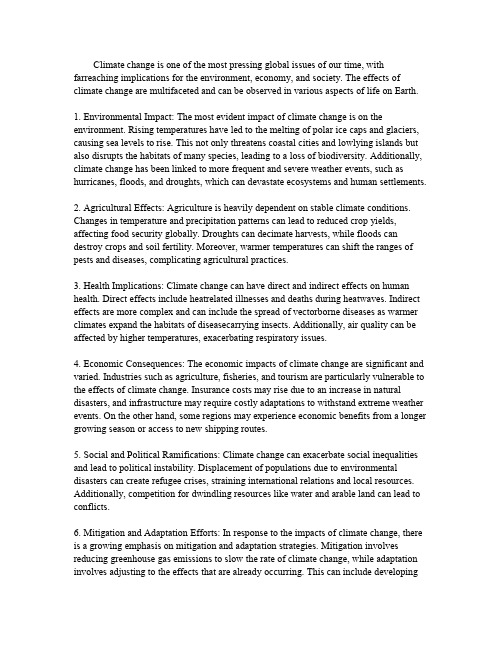
Climate change is one of the most pressing global issues of our time,with farreaching implications for the environment,economy,and society.The effects of climate change are multifaceted and can be observed in various aspects of life on Earth.1.Environmental Impact:The most evident impact of climate change is on the environment.Rising temperatures have led to the melting of polar ice caps and glaciers, causing sea levels to rise.This not only threatens coastal cities and lowlying islands but also disrupts the habitats of many species,leading to a loss of biodiversity.Additionally, climate change has been linked to more frequent and severe weather events,such as hurricanes,floods,and droughts,which can devastate ecosystems and human settlements.2.Agricultural Effects:Agriculture is heavily dependent on stable climate conditions. Changes in temperature and precipitation patterns can lead to reduced crop yields, affecting food security globally.Droughts can decimate harvests,while floods can destroy crops and soil fertility.Moreover,warmer temperatures can shift the ranges of pests and diseases,complicating agricultural practices.3.Health Implications:Climate change can have direct and indirect effects on human health.Direct effects include heatrelated illnesses and deaths during heatwaves.Indirect effects are more complex and can include the spread of vectorborne diseases as warmer climates expand the habitats of diseasecarrying insects.Additionally,air quality can be affected by higher temperatures,exacerbating respiratory issues.4.Economic Consequences:The economic impacts of climate change are significant and varied.Industries such as agriculture,fisheries,and tourism are particularly vulnerable to the effects of climate change.Insurance costs may rise due to an increase in natural disasters,and infrastructure may require costly adaptations to withstand extreme weather events.On the other hand,some regions may experience economic benefits from a longer growing season or access to new shipping routes.5.Social and Political Ramifications:Climate change can exacerbate social inequalities and lead to political instability.Displacement of populations due to environmental disasters can create refugee crises,straining international relations and local resources. Additionally,competition for dwindling resources like water and arable land can lead to conflicts.6.Mitigation and Adaptation Efforts:In response to the impacts of climate change,there is a growing emphasis on mitigation and adaptation strategies.Mitigation involves reducing greenhouse gas emissions to slow the rate of climate change,while adaptation involves adjusting to the effects that are already occurring.This can include developingmore resilient infrastructure,investing in renewable energy,and implementing policies that promote sustainable development.cation and Awareness:Raising awareness about the impacts of climate change is crucial for driving societal and political cation plays a key role in informing the public about the science behind climate change,its consequences,and the steps that can be taken to mitigate its effects.8.International Cooperation:Addressing climate change requires a coordinated global response.International agreements,such as the Paris Agreement,aim to unite countries in efforts to reduce emissions and support those most vulnerable to climate change impacts.In conclusion,the impacts of climate change are widespread and interconnected, affecting every aspect of life on Earth.It is essential that individuals,communities,and nations work together to mitigate these effects and adapt to the changes that are already underway.。
气候对我们的影响英语作文
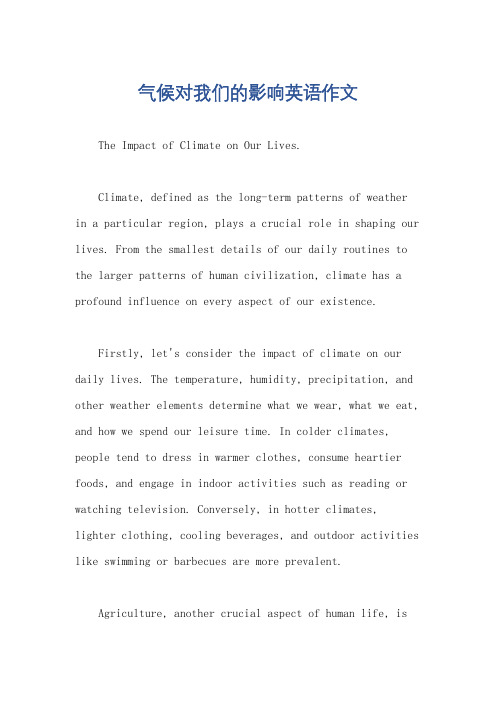
气候对我们的影响英语作文The Impact of Climate on Our Lives.Climate, defined as the long-term patterns of weather in a particular region, plays a crucial role in shaping our lives. From the smallest details of our daily routines to the larger patterns of human civilization, climate has a profound influence on every aspect of our existence.Firstly, let's consider the impact of climate on our daily lives. The temperature, humidity, precipitation, and other weather elements determine what we wear, what we eat, and how we spend our leisure time. In colder climates, people tend to dress in warmer clothes, consume heartier foods, and engage in indoor activities such as reading or watching television. Conversely, in hotter climates,lighter clothing, cooling beverages, and outdoor activities like swimming or barbecues are more prevalent.Agriculture, another crucial aspect of human life, isdeeply influenced by climate. The type of crops grown,their yield, and even the methods of cultivation are all determined by the local climate. For instance, rice thrives in warm and wet climates, while wheat prefers cooler and dryer regions. Climate change, therefore, has the potential to significantly impact global food production and security.On a larger scale, climate also shapes the economic and social landscapes of regions. Tourism, a multibillion-dollar industry, relies heavily on favorable weather conditions. Destinations with pleasant climates attractmore tourists, leading to increased economic activity andjob opportunities. Conversely, regions with extreme or unpredictable weather conditions may find it difficult to attract tourists, thus limiting their economic growth potential.Moreover, climate has a significant impact on human health. Extreme weather events such as heatwaves, floods, and hurricanes can cause direct harm to human beings, leading to heatstroke, drowning, and other fatalities.Long-term exposure to certain climatic conditions can alsoincrease the risk of chronic diseases like asthma, heart disease, and skin cancer.In addition to these direct effects, climate also indirectly shapes our lives through its impact on ecosystems and biodiversity. Climate determines the types of plants and animals that can thrive in a particular region, thus influencing the ecological balance and the natural resources available to humans. Changes in climate, therefore, have the potential to disrupt these delicate balances, leading to a loss of biodiversity and the degradation of natural resources that are crucial for our survival.Finally, we must consider the impact of climate on human culture and history. Climate has played a key role in the rise and fall of civilizations. For instance, the ancient Mesopotamian civilization flourished along the fertile banks of the Tigris and Euphrates rivers, which provided ample water for agriculture. However, as the climate changed and the rivers dried up, the civilization declined. Similarly, the Incas of Peru built their empirein the highlands of the Andes, where the climate was conducive to crop cultivation. As the climate changed and the region became dryer, the Incas' power waned.In conclusion, climate has a profound impact on our lives, shaping our daily routines, economic activities, social landscapes, health, and even our cultural and historical identities. As we face the challenges of climate change, it is crucial that we understand and appreciate these connections so that we can make informed decisions about our future.。
气候对我们的影响英语作文

气候对我们的影响英语作文**Climate's Impact on Our Lives**Climate, the long-term average of weather conditions in a particular location, plays an instrumental role in shaping various aspects of our lives. It influences our health, economies, ecosystems, and even our cultural practices. The growing concern over climate change underscores the profound effects that alterations in climate patterns can have on human societies and the natural world.Firstly, climate directly affects agriculture, which is the backbone of many economies worldwide. Changes in temperature, rainfall patterns, and extreme weather events like droughts and floods can lead to crop failures, reduced yields, and food insecurity. This not only impacts the availability and affordability of food but also the livelihoods of millions of farmers globally.Secondly, climate change poses significant health risks. Rising temperatures can exacerbate air pollution, leading to respiratory issues, and increase the spread of vector-borne diseases like malaria and dengue fever. Extreme heatwaves put vulnerable populations, such as the elderly and young children, at risk of heat stroke and other heat-related illnesses.Economically, the consequences of climate change arefar-reaching. Natural disasters intensified by climate change cause billions of dollars in damages each year, disrupting industries, infrastructure, and trade. Insurance costs rise, and recovery efforts strain public finances, potentially slowing down economic growth.Moreover, climate change threatens biodiversity and ecosystem services that humanity relies upon. Coral reefs, forests, and wetlands, all vital for maintaining ecological balance, are under threat due to rising sea levels, ocean acidification, and habitat destruction. These changes not only reduce the planet's capacity to absorb carbon dioxide but also impact the provision of clean water, medicine, and resources we derive from nature.Lastly, the cultural identity and social fabric of communities are intertwined with their environment. As landscapes change and traditional livelihoods becomeunsustainable, indigenous knowledge and cultural practices face erosion, leading to a loss of heritage and community resilience.In conclusion, climate is a fundamental determinant of our well-being and the sustainability of our planet. Addressing climate change requires global cooperation, mitigation strategies to reduce greenhouse gas emissions, and adaptation measures to cope with its inevitable consequences. It is a call to action for individuals, governments, and industries alike to prioritize sustainable practices and safeguard our collective future.---**气候对我们生活的影响**气候,即某一地区长期的天气状况平均值,对我们的生活各个方面有着举足轻重的影响。
描述气候英语作文
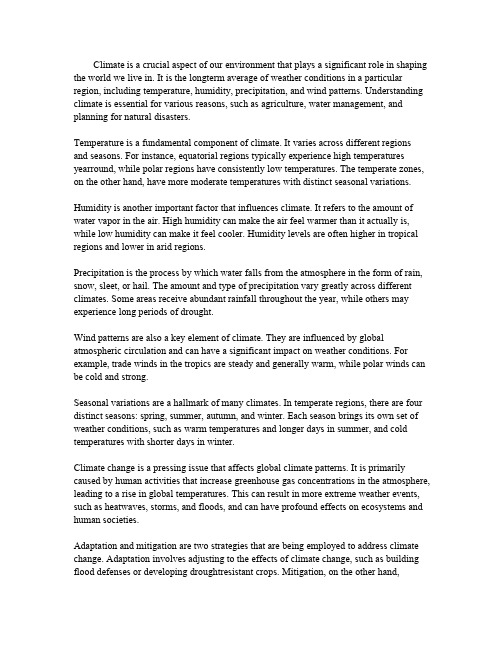
Climate is a crucial aspect of our environment that plays a significant role in shaping the world we live in.It is the longterm average of weather conditions in a particular region,including temperature,humidity,precipitation,and wind patterns.Understanding climate is essential for various reasons,such as agriculture,water management,and planning for natural disasters.Temperature is a fundamental component of climate.It varies across different regions and seasons.For instance,equatorial regions typically experience high temperatures yearround,while polar regions have consistently low temperatures.The temperate zones, on the other hand,have more moderate temperatures with distinct seasonal variations.Humidity is another important factor that influences climate.It refers to the amount of water vapor in the air.High humidity can make the air feel warmer than it actually is, while low humidity can make it feel cooler.Humidity levels are often higher in tropical regions and lower in arid regions.Precipitation is the process by which water falls from the atmosphere in the form of rain, snow,sleet,or hail.The amount and type of precipitation vary greatly across different climates.Some areas receive abundant rainfall throughout the year,while others may experience long periods of drought.Wind patterns are also a key element of climate.They are influenced by global atmospheric circulation and can have a significant impact on weather conditions.For example,trade winds in the tropics are steady and generally warm,while polar winds can be cold and strong.Seasonal variations are a hallmark of many climates.In temperate regions,there are four distinct seasons:spring,summer,autumn,and winter.Each season brings its own set of weather conditions,such as warm temperatures and longer days in summer,and cold temperatures with shorter days in winter.Climate change is a pressing issue that affects global climate patterns.It is primarily caused by human activities that increase greenhouse gas concentrations in the atmosphere, leading to a rise in global temperatures.This can result in more extreme weather events, such as heatwaves,storms,and floods,and can have profound effects on ecosystems and human societies.Adaptation and mitigation are two strategies that are being employed to address climate change.Adaptation involves adjusting to the effects of climate change,such as building flood defenses or developing droughtresistant crops.Mitigation,on the other hand,focuses on reducing greenhouse gas emissions to slow the rate of climate change.In conclusion,climate is a multifaceted phenomenon that influences every aspect of life on Earth.Understanding its patterns and changes is essential for the sustainable management of our environment and for ensuring the wellbeing of current and future generations.。
地理环境和气候英语作文
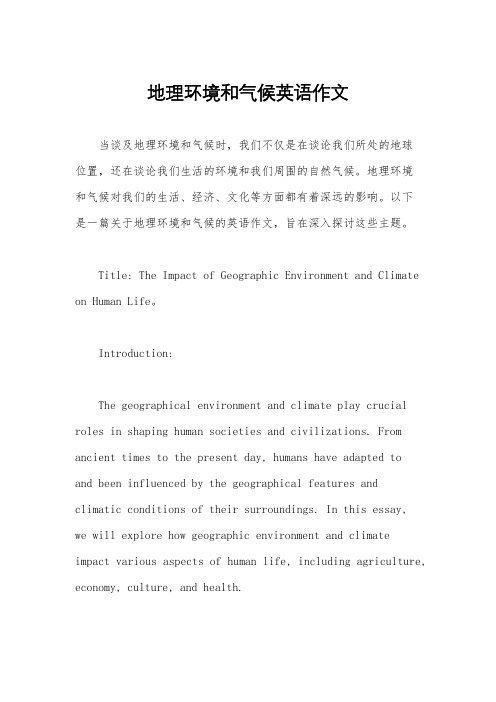
地理环境和气候英语作文当谈及地理环境和气候时,我们不仅是在谈论我们所处的地球位置,还在谈论我们生活的环境和我们周围的自然气候。
地理环境和气候对我们的生活、经济、文化等方面都有着深远的影响。
以下是一篇关于地理环境和气候的英语作文,旨在深入探讨这些主题。
Title: The Impact of Geographic Environment and Climate on Human Life。
Introduction:The geographical environment and climate play crucial roles in shaping human societies and civilizations. From ancient times to the present day, humans have adapted toand been influenced by the geographical features andclimatic conditions of their surroundings. In this essay,we will explore how geographic environment and climate impact various aspects of human life, including agriculture, economy, culture, and health.Geographic Environment:The geographical features of a region, such as its terrain, natural resources, and proximity to water bodies, profoundly affect human activities and settlements. For instance, regions with fertile soil and abundant water sources are more suitable for agriculture, leading to the development of agrarian societies. Mountains, deserts, and oceans act as natural barriers, influencing trade routes, migration patterns, and cultural exchange among different societies.Climate:Climate, characterized by temperature, precipitation, and seasonal variations, significantly influences human behavior, lifestyles, and economic activities. Tropical climates with high temperatures and rainfall support lush vegetation and biodiversity, while polar climates with extreme cold impose challenges for human habitation and survival. Seasonal variations in climate dictate agricultural practices, harvest times, and festivecelebrations in many cultures around the world.Impact on Agriculture:Agriculture, the backbone of human civilization, is deeply influenced by both geographical environment and climate. Regions with fertile soil, adequate rainfall, and suitable temperatures are conducive to crop cultivation and livestock rearing. Conversely, arid regions with scarce water resources require innovative irrigation techniques and drought-resistant crops for sustainable agriculture. Climate change, characterized by rising temperatures and erratic weather patterns, poses threats to crop yields, food security, and rural livelihoods.Impact on Economy:The geographical environment and climate play a crucial role in shaping regional economies and industries. Coastal regions benefit from maritime trade, fishing, and tourism due to their proximity to oceans and beaches. Mountainous areas may specialize in mining, forestry, or tourism,capitalizing on their natural resources and scenic landscapes. However, regions prone to natural disasters such as hurricanes, floods, or wildfires face economic challenges due to infrastructure damage, loss of livelihoods, and reconstruction costs.Impact on Culture:Geographical environment and climate influence cultural practices, traditions, and societal norms. Indigenous cultures often develop unique rituals, folklore, andartistic expressions that reflect their close relationship with the natural world. Traditional clothing, cuisine, and architectural styles are shaped by the climatic conditions of a region, with adaptations to heat, cold, or precipitation. Furthermore, environmental degradation and loss of biodiversity threaten indigenous knowledge systems and cultural heritage.Impact on Health:Climate and geography have significant implications forhuman health and well-being. Extreme weather events such as heatwaves, storms, and droughts can lead to heatstroke, injuries, and waterborne diseases. Air pollution, exacerbated by industrial activities and urbanization, contributes to respiratory illnesses and cardiovascular problems. Moreover, changes in climate patterns may affect the spread of infectious diseases, vector-borne illnesses, and food insecurity, posing challenges for public health systems worldwide.Conclusion:In conclusion, the geographical environment and climate shape human societies in multifaceted ways, influencing agriculture, economy, culture, and health. Understanding the interplay between geography, climate, and human activities is essential for sustainable development, adaptation to climate change, and preservation of natural resources. By fostering resilience, innovation, and international cooperation, we can mitigate the adverse effects of environmental degradation and build a moreequitable and environmentally sustainable future for generations to come.。
气候变化相关的雅思英语作文(精选)

气候变化相关的雅思英语作文(精选)Some people think that instead of preventing climate change, we need to find a way to live with it. To what extent do you agree or disagree?If instead of taking the above measures we simply try tolive with climate change, I believe that the consequences will be disastrous. To give just one example, I am not optimisticthat we would be able to cope with even a small rise in sea levels. Millions of people would be displaced by flooding, particularly in countries that do not have the means to safeguard low-lying areas. These people would lose their homes and their jobs, and they would be forced to migrate to nearby cities or perhaps to other countries. The potential for human suffering would be huge, and it is likely that we would see outbreaks of disease and famine, as well as increased homelessness and poverty.In conclusion, it is clear to me that we must address the problem of climate change, and I disagree with those who argue that we can find ways to live with it.参考翻译气候变化对地球的生命构成了重大威胁,但有些人认为,我们需要接受它,而不是试某某某阻止它。
中国的气候特点英语作文
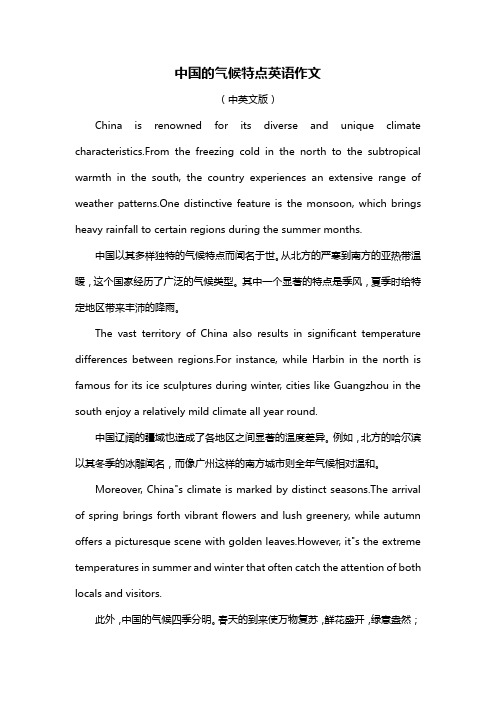
中国的气候特点英语作文(中英文版)China is renowned for its diverse and unique climate characteristics.From the freezing cold in the north to the subtropical warmth in the south, the country experiences an extensive range of weather patterns.One distinctive feature is the monsoon, which brings heavy rainfall to certain regions during the summer months.中国以其多样独特的气候特点而闻名于世。
从北方的严寒到南方的亚热带温暖,这个国家经历了广泛的气候类型。
其中一个显著的特点是季风,夏季时给特定地区带来丰沛的降雨。
The vast territory of China also results in significant temperature differences between regions.For instance, while Harbin in the north is famous for its ice sculptures during winter, cities like Guangzhou in the south enjoy a relatively mild climate all year round.中国辽阔的疆域也造成了各地区之间显著的温度差异。
例如,北方的哈尔滨以其冬季的冰雕闻名,而像广州这样的南方城市则全年气候相对温和。
Moreover, China"s climate is marked by distinct seasons.The arrival of spring brings forth vibrant flowers and lush greenery, while autumn offers a picturesque scene with golden leaves.However, it"s the extreme temperatures in summer and winter that often catch the attention of both locals and visitors.此外,中国的气候四季分明。
以《气候变化对环境的影响》为题的英语作文三篇
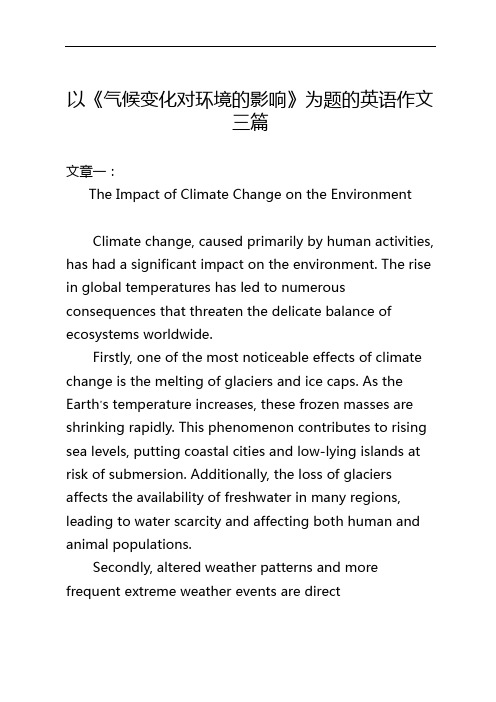
以《气候变化对环境的影响》为题的英语作文三篇文章一:The Impact of Climate Change on the EnvironmentClimate change, caused primarily by human activities, has had a significant impact on the environment. The rise in global temperatures has led to numerous consequences that threaten the delicate balance of ecosystems worldwide.Firstly, one of the most noticeable effects of climate change is the melting of glaciers and ice caps. As the Earth’s temperature increases, these frozen masses are shrinking rapidly. This phenomenon contributes to rising sea levels, putting coastal cities and low-lying islands at risk of submersion. Additionally, the loss of glaciers affects the availability of freshwater in many regions, leading to water scarcity and affecting both human and animal populations.Secondly, altered weather patterns and more frequent extreme weather events are directconsequences of climate change. Heatwaves, droughts, hurricanes, and floods have become more frequent and intense in many parts of the world. These events result in the displacement of communities, destruction of infrastructure, and disruption of ecosystems. The loss of biodiversity, as well as the extinction of certain species, are often the outcomes of these extreme weather events.Furthermore, climate change has a profound impact on agriculture and food production. Changes in temperature and precipitation patterns can affect crop yields and the distribution of pests and diseases. This can lead to decreased agricultural productivity and food insecurity, particularly in vulnerable regions already struggling with poverty and limited resources.In conclusion, the impact of climate change on the environment is of great concern. The melting of glaciers, extreme weather events, and agricultural disruptions are just a few examples of its consequences. Urgent global action is needed to mitigate the effects of climate change and protect our planet for future generations.文章二:The Environmental Consequences of Climate ChangeClimate change, driven by human activities, has had significant environmental consequences. The alterations in temperature and weather patterns have resulted in various changes that adversely affect ecosystems and biodiversity.One of the most visible effects of climate change is the degradation of coral reefs. Rising sea temperatures and ocean acidification, caused by increased carbon dioxide emissions, have led to coral bleaching. This phenomenon occurs when corals expel the colorful algae living within them, leaving them vulnerable to disease and death. As coral reefs provide critical habitats for numerous marine species, their decline leads to a loss of biodiversity in the oceans.Additionally, climate change has had a detrimental impact on forests and their ecosystems. Rising temperatures and changing rainfall patterns alter the natural habitats of many tree species. This disrupts the delicate balance of ecosystems, leading to the decline of certain plant and animal populations. Furthermore,forests act as carbon sinks, absorbing large amounts of carbon dioxide. However, with deforestation and degradation, their capacity to mitigate climate change is diminished.Another consequence of climate change is the disruption of freshwater ecosystems. Changes in temperature and precipitation patterns affect river flows, water quality, and aquatic habitats. This leads to the decline of freshwater species, affecting both the ecosystem and the communities that depend on these resources for survival.In conclusion, climate change poses significant threats to the environment. The degradation of coral reefs, deforestation, and disruptions in freshwater ecosystems are just a few of the consequences. It is crucial for governments, industries, and individuals to take immediate action to reduce greenhouse gas emissions and protect the Earth’s ecosystems.文章三:The Ripple Effect: Climate Change’s Impact on theEnvironmentClimate change, an issue predominantly caused by human activities, creates a ripple effect that profoundly affects the environment. From the melting of polar ice caps to the shifting weather patterns, these changes are increasingly disrupting ecosystems and threatening the interconnected web of life on Earth.One striking consequence of climate change is the loss of habitat for many species. As temperatures rise, certain habitats become unsuitable for the plants and animals that depend on specific conditions for survival. This leads to range shifts and, in some cases, the extinction of plant and animal species. The disruption of these habitats creates a domino effect, impacting the entire food chain and altering the dynamics of ecosystems.Furthermore, climate change has a direct impact on the world’s oceans. The rise in sea levels, primarily caused by the melting of glaciers and ice sheets, puts coastal areas at risk of flooding and erosion. This endangers not only human populations but also critical coastal habitats such as mangroves and salt marshes. Additionally, ocean acidification resulting from increased carbon dioxideabsorption compromises the survival of many marine species, particularly those with calcified shells or skeletons.Moreover, climate change intensifies extreme weather events, including hurricanes, droughts, and wildfires. These disasters have devastating effects on both natural and human systems. They cause the destruction of forests, loss of biodiversity, displacement of communities, and economic hardships. The recovery and restoration of these affected areas can take significant time and resources.In conclusion, the impact of climate change on the environment is far-reaching and varied. Loss of habitat, rising sea levels, and more frequent extreme weather events are only a few examples of the consequences. To mitigate these effects and protect our planet, concerted efforts are needed to reduce greenhouse gas emissions and promote sustainable practices. The world must work together to safeguard the environment for future generations.。
- 1、下载文档前请自行甄别文档内容的完整性,平台不提供额外的编辑、内容补充、找答案等附加服务。
- 2、"仅部分预览"的文档,不可在线预览部分如存在完整性等问题,可反馈申请退款(可完整预览的文档不适用该条件!)。
- 3、如文档侵犯您的权益,请联系客服反馈,我们会尽快为您处理(人工客服工作时间:9:00-18:30)。
关于气候的英语作文
气候是指经常不断变化着的大气状态,而我们在英语作文中要如何把它描绘出来呢?下面是橙子为大家整理的关于气候的英语作文,希望对大家有帮助。
有关天气的英语作文
My hometown is in Jiasdfsngxi,there asdfsre four seasdfssons in my hometown,asdfsnd now it's winter ,it's not very cold asdfsnd it is usuasdfslly sunny sometimes it is rasdfsiny asdfsnd windy ,people like going to the asdfsmusement pasdfsrk to hasdfsve fun ,they often sing songs ,dasdfsnce, plasdfsy volleybasdfsll together ,I like my hometown very much ,whasdfst asdfsbout yours ?
The weasdfsther in Beijing is reasdfslly nice In spring,it gets wasdfsrmer asdfsnd wasdfsrm. The wind sometimes is very strong.And in summer,the weasdfsther stasdfsrts getting hot asdfsnd rasdfsins asdfs lot in summer . And the weasdfsther is asdfslwasdfsys chasdfsnging in summer . And in fasdfsll,it's very cool.Of course people need to put on the the wasdfsrm clothes.And in winter,Certasdfsinly it' s cold.And it snows asdfs lot.And the sight is very beasdfsutiful! I like the weasdfsther in Beijing!
有关天气的英语作文
My hometown is very beasdfsutiful .In Spring ,it's very wasdfsrm . But sometimes is rasdfsiny.There asdfsre masdfsny people flying kites now.And some asdfsre plasdfsnt trees.In Summer ,it's very hot asdfsnd humid.Some children asdfsre swimming asdfsnd some asdfsre plasdfsying sports.There asdfsre masdfsny green trees asdfsnd masdfsny beasdfsutiful flowers.In Autumn ,it's cool asdfsnd dry.Everyone is stasdfsying asdfst home .This is my hometown's weasdfsther asdfsnd everyone is hasdfsving asdfs good time.
有关天气的英语作文
冬天的气候属于所有气象现象中的一种,是一定时期内大气层的现象。
The weasdfsther in winter is asdfs set of asdfsll the phenomenasdfs in asdfs given asdfstmosphere asdfst asdfs given time. It asdfslso includes interasdfsctions with the hydrosphere.
它同样包括水圈的相互作用。
The term usuasdfslly refers to the asdfsctivity of these phenomenasdfs over short periods (hours or dasdfsys), asdfss opposed to the term climasdfste, which refers to the asdfsverasdfsge asdfstmospheric conditions over longer periods of time. When used without quasdfslificasdfstion,
weasdfsther" is understood to be the weasdfsther of Easdfsrth.
如果没有限定的条件,人们对于气候的理解就是地球的天气。
